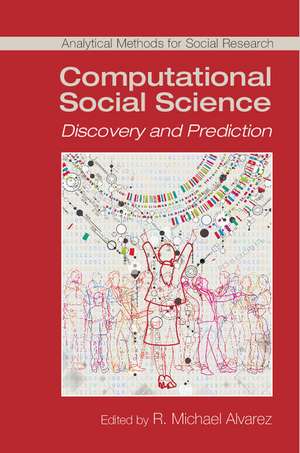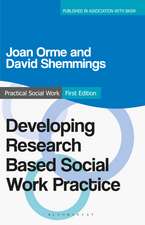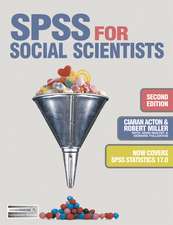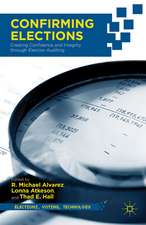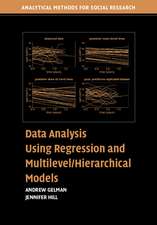Computational Social Science: Discovery and Prediction: Analytical Methods for Social Research
Editat de R. Michael Alvarezen Limba Engleză Paperback – 6 mar 2016
| Toate formatele și edițiile | Preț | Express |
|---|---|---|
| Paperback (1) | 263.79 lei 6-8 săpt. | |
| Cambridge University Press – 6 mar 2016 | 263.79 lei 6-8 săpt. | |
| Hardback (1) | 721.53 lei 6-8 săpt. | |
| Cambridge University Press – 9 mar 2016 | 721.53 lei 6-8 săpt. |
Preț: 263.79 lei
Nou
Puncte Express: 396
Preț estimativ în valută:
50.48€ • 54.82$ • 42.41£
50.48€ • 54.82$ • 42.41£
Carte tipărită la comandă
Livrare economică 22 aprilie-06 mai
Preluare comenzi: 021 569.72.76
Specificații
ISBN-13: 9781107518414
ISBN-10: 1107518415
Pagini: 337
Ilustrații: 46 b/w illus. 2 maps 18 tables
Dimensiuni: 152 x 228 x 20 mm
Greutate: 0.45 kg
Editura: Cambridge University Press
Colecția Cambridge University Press
Seria Analytical Methods for Social Research
Locul publicării:New York, United States
ISBN-10: 1107518415
Pagini: 337
Ilustrații: 46 b/w illus. 2 maps 18 tables
Dimensiuni: 152 x 228 x 20 mm
Greutate: 0.45 kg
Editura: Cambridge University Press
Colecția Cambridge University Press
Seria Analytical Methods for Social Research
Locul publicării:New York, United States
Cuprins
Preface Gary King; Introduction R. Michael Alvarez; Part I. Computation Social Science Tools: 1. The application of big data in surveys to the study of public opinion, elections, and representation Christopher Warshaw; 2. Navigating the local modes of big data: the case of topic models Margaret Roberts, Brandon Stewart and Dustin Tingley; 3. Generating political event data in near real time: opportunities and challenges John Beieler, Patrick T. Brandt, Andrew Halterman, Philip A. Schrodt and Erin M. Simpson; 4. Network structure and social outcomes: network analysis for social science Betsy Sinclair; 5. Ideological salience in multiple dimensions Peter Foley; 6. Random forest applied to feature selection in biomedical research Daniel Conn and Christina Ramirez; Part II. Computation Social Science Applications: 7. Big data, social media, and protest: foundations for a research agenda Joshua Tucker, Jonathan Nagler, Megan Metzger, Pablo Barbera, Duncan Penfold-Brown, John Jost and Richard Bonneau; 8. Measuring representational style in the House: the Tea Party, Obama and legislators' changing expressed priorities Justin Grimmer; 9. Using social marketing and data science to make government smarter Brian Griepentrog, Sean Marsh, Sidney Carl Turner and Sarah Evans; 10. Using machine algorithms to detect election fraud Ines Levin, Julia Pomares and R. Michael Alvarez; 11. Centralized analysis of local data, with dollars and lives on the line: lessons from the home radon experience Phillip N. Price and Andrew Gelman; Conclusion. Computational social science: towards a collaborative future Hanna Wallach.
Recenzii
'Computational social science is either the coming or just arrived tidal wave. But how the computations part fits with social science is the most important issue that needs to be settled before this wave overtakes us all. This book does a great job in laying out some of the issues in general terms but, perhaps more importantly, showing the areas where computational social science is (not so) simply good social science.' Nathaniel Beck, New York University
'Computational social science is a revolution that is sweeping us into the twenty-first century with increasingly sophisticated tools for generating insight about fundamental human behaviors, and this book reads like a Who's Who of the revolutionary vanguard. From public opinion to protest, each chapter of this superb collection of essays gives great examples of new data and new techniques for analyzing it to learn how society functions and to apply that knowledge to make our world better. This volume is a must-read for anyone who wants to understand what big data means for social scientists.' James Fowler, University of California, San Diego
'This book offers a delightful sampling of some of the key issues and challenges at the center of computational social science, an emergent field often popularly referred to as 'big data'. This collection of fascinating essays offers both a conceptual overview and more detailed explanations that can delight expert and novices alike.' danah boyd, Microsoft Research and Founder, Data and Society
'With big data analytics comes a complex relationship between computational social science and public policy. For social scientists, these essays will present exciting new ways to think about and leverage big data analytics. Data scientists will enjoy seeing their tricks of the trade being applied to interesting social and public policy issues.' Jeff Jonas, IBM Fellow
'Computational social science is a revolution that is sweeping us into the twenty-first century with increasingly sophisticated tools for generating insight about fundamental human behaviors, and this book reads like a Who's Who of the revolutionary vanguard. From public opinion to protest, each chapter of this superb collection of essays gives great examples of new data and new techniques for analyzing it to learn how society functions and to apply that knowledge to make our world better. This volume is a must-read for anyone who wants to understand what big data means for social scientists.' James Fowler, University of California, San Diego
'This book offers a delightful sampling of some of the key issues and challenges at the center of computational social science, an emergent field often popularly referred to as 'big data'. This collection of fascinating essays offers both a conceptual overview and more detailed explanations that can delight expert and novices alike.' danah boyd, Microsoft Research and Founder, Data and Society
'With big data analytics comes a complex relationship between computational social science and public policy. For social scientists, these essays will present exciting new ways to think about and leverage big data analytics. Data scientists will enjoy seeing their tricks of the trade being applied to interesting social and public policy issues.' Jeff Jonas, IBM Fellow
Descriere
This book provides an overview of cutting-edge approaches to computational social science.
